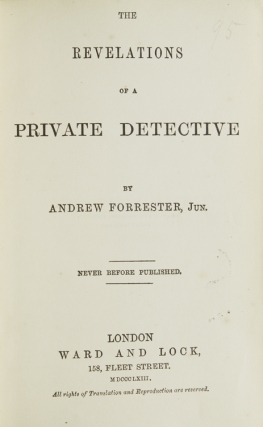
The Encyclopedia of Fantastic Victoriana
by Jess Nevins

Revelations of a Private Detective (1863)
copyright © Jess Nevins 2022
The Revelations of a Private Detective, and its sequel Secret Service or Recollections of a City Detective (1864), were written by “Andrew Forrester.” “Andrew Forrester” was the pseudonym of J. Redding Ware (1832-1909), an author and editor who wrote about everything from detective fiction to English slang to the Isle of Wight.1
Andrew Forrester is a casebook detective. He is the narrator of his stories; some of the other stories he narrates are about other characters and do not involve him at all. But there are also several stories in which he is the main character as well as the narrator. Forrester provides relatively little background information on himself. The stories claim he is based on a real London detective, something which prompted an angry letter of denial to the Times of London by two policeman in 1863. Forrester mentions a wife and child, and says with some pride that he is called in when “ordinary means and common detectives fail.”2 Like several of the other early fictional detectives he works for the police but will take jobs on the side from private clients for the reward money. Forrester is devoted to seeing justice done, of course, but he is also conscious of money, in one story to the extent of being willing to take money in exchange for keeping silent about a crime. In the context of the story, Forrester taking the money is not an entirely mercenary act. The pride and face of a lord were at stake, and revealing the crime would only have shamed the nobleman. But it is still indicative of Forrester's attitude that he was willing to accept money to be quiet about the crime, rather than selflessly going along with the lord's suggestion.
As a detective Forrester’s methods are straightforward but intelligent. He questions suspects and witnesses, closely examines crime scenes for clues and evidence, draws conclusions in an intelligent manner, and when necessary calls in scientific experts for help. In a touch of pulpishness, one of Forrester's friends is a “peculiar mathematical genius”3 who can break any cipher and is an expert at solving puzzles. He often advises the police on crimes, and is responsible for helping Forrester solve a particularly difficult case. Forrester works with a higher class of people than other casebook detectives like John Bennett’s Tom Fox (see: Tom Fox; or, The Revelations of a Detective) or James M'Govan (see: Brought to Bay; or, Experience of a City Detective); Forrester's clients are lawyers and members of the aristocracy. The criminals Forrester handles–gold-digging women, crooked lawyers, kleptomaniac lords and their thieving children–are also from a higher class than Fox or M'Govan dealt with. But like them, Forrester is aware of the harsher elements of life, and alludes to prostitutes and other unfortunate realities in his stories.
Recommended Edition
Print: Andrew Forrester, The Revelations of a Private Detective. London: Ward and Lock, 1863.
Online: https://archive.org/details/168389493.5598.emory.edu/page/n5
1 E.F. Bleiler suggests that “Andrew Forrester” was “a pseudonym chosen to capitalize on the fame of the historical Forrester brothers, who served as detectives for the City of London and were pioneers in the application of scientific methods to detection.” Qtd in Michael Sims, “Andrew Forrester,” 32.
2 Andrew Forrester, Revelations of a Private Detective (London: Ward and Lock, 1863), 3.
3 Forrester, Revelations, 112.